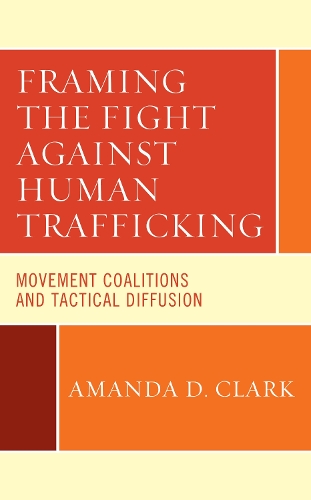
Framing the Fight against Human Trafficking: Movement Coalitions and Tactical Diffusion
(Hardback)
Publishing Details
Framing the Fight against Human Trafficking: Movement Coalitions and Tactical Diffusion
By (Author) Amanda D. Clark
Bloomsbury Publishing PLC
Lexington Books
4th June 2019
United States
Classifications
Professional and Scholarly
Non Fiction
Central / national / federal government policies
Society and culture: general
341.2
Physical Properties
Hardback
178
Width 158mm, Height 242mm, Spine 18mm
472g
Description
Nongovernmental organizations (NGOs) in the antihuman trafficking movement have proliferated over the past few decades, each focusing on different aspects of the problem. Many of these NGOs have joined coalitions to pool resources and expertise. What are the messages that NGOs use to define and prescribe solutions to the human trafficking issue How do changes in the external political environment or the internal coalition structure impact NGO framing strategy This book uses a unique dataset to illustrate and analyze the discursive processes of NGOs over three distinct time periods: 20082010, 20112012, and 20132014. The data was gathered from public documents and supplemented by interviews from fifteen US anti-trafficking NGOs involved in the Alliance to End Slavery and Trafficking (ATEST). This analysis shows that the ATEST coalition has targeted the state (contentious politics) and private industry (private politics) to advance its antihuman trafficking agenda. Sex trafficking has normally been met with tactics from the contentious politics model due to its historical legal connection with prostitution; labor trafficking, on the other hand, has been approached via the private politics model due to its connection with business. However, due to the coalitions formal organizational structure, members have been able to learn from each other and adopt tactics normally reserved for certain types of targets in new ways, such as using contentious political strategies for labor trafficking and vice versa. This study builds theory by showing how coalition learning in social movements across time periods can diffuse tactics and provide new action repertoires for coalition members.
Reviews
This meticulously researched and well-written book offers a timely investigation into the pressing global problem of human trafficking. Through a sophisticated multi-method analysis of the evolution of the core organizations fighting human trafficking, we learn a great deal about the framing strategies, tactics, outcomes and coalitional dynamics of this particular movement industry. This tour de force should be read by organizational and social movement scholars alike, as well as by policy-makers working on human trafficking. -- Sarah A. Soule, Stanford University
Author Bio
Amanda D. Clark, PhD, is independent scholar.
